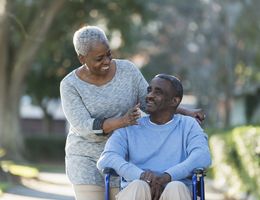Caring for a stroke survivor

Tips for taking care of your loved one—and yourself—after a stroke.
After a stroke, your loved one is going to need ongoing care.
Much of that care will come from medical professionals, such as doctors and rehabilitation specialists. But your role as a caregiver is also important. "Caregivers really make a huge difference in a stroke survivor's recovery," says Barry J. Jacobs, PsyD, a clinical psychologist and a spokesman for the American Heart Association. "Many stroke survivors only do as well as their caregivers do."
What caregivers do
When your loved one is first hospitalized after a stroke, you may suddenly find yourself acting as his or her voice and chief advocate. That's because a stroke can affect behavior, memory, communication and physical capabilities, according to the Family Caregiver Alliance (FCA).
"What a caregiver does for a stroke survivor is absolutely essential. A caregiver plays an enormous role in the rehabilitation process," says Dr. Jacobs, who is also the author of The Emotional Survival Guide for Caregivers: Looking After Yourself and Your Family While Helping an Aging Parent (Guilford, 2006).
As a primary caregiver, you may be involved in choosing a rehabilitation facility, coordinating home-care service, providing transportation, housekeeping and cooking, and communicating with doctors and other healthcare professionals. You may also find yourself dealing with your loved one's emotional and physical care needs, and providing mental and social stimulation.
"As a caregiver, you are pretty much a deputized therapist that is on hand to administer therapy and look after all of your loved one's needs at home," Dr. Jacobs says.
Tips for caregiving success
Caring for a stroke survivor can be challenging. But helping your loved one down the road to recovery can also be a rewarding experience.
Dr. Jacobs offers these tips to help caregivers be successful:
Educate yourself. Try to learn as much as you can about your loved one's condition and how it may change over time. "Stroke is an illness where people are generally at their worst at the beginning," Dr. Jacobs says. "You have to understand that, over time, your loved one's condition should improve and that there is hope."
Have patience. Recovering from a stroke takes time. "It's not a sprint; it's a marathon. Recovery can be a multimonth or even years-long process," Dr. Jacobs says.
Don't try to do too much. "You can't be with a stroke survivor 24 hours a day," Dr. Jacobs says. "You need to get help from family members and friends."
Plan to make adjustments at home and to your daily routine. "The adjustments you make depend on the severity of the stroke," Dr. Jacobs says. "For example, if your loved one has significant physical problems, you may have to make changes to your home environment such as installing grab bars or moving your loved one's living quarters to the first floor."
Work on good communication. "A stroke can affect how your loved one communicates," Dr. Jacobs says. "Talk to your doctor about how you can best communicate with each other."
Take care of yourself. Along with providing good care for your loved one, you also need to remember that it is not selfish to focus on your own needs and desires. It's an important part of your role as a caregiver.
The FCA offers these self-care tips:
- Learn to use stress-reduction techniques.
- Take care of your own healthcare needs.
- Get proper rest and nutrition.
- Exercise regularly.
- Make time to do the things you enjoy without feeling guilty.
"As a caregiver, you must feel comfortable about getting help for yourself from doctors, mental health professionals and others when you need it," Dr. Jacobs says. "By taking care of yourself, you can be a better caregiver."
Reviewed 11/21/2024
